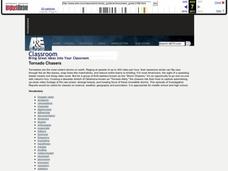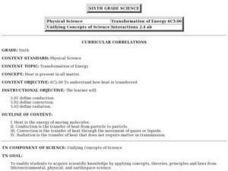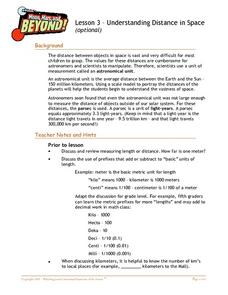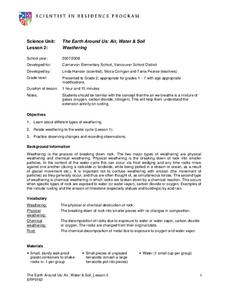Curated OER
Tornado Chasers
Students explore how tornadoes are the most violent storms on earth. Raging at speeds of up to 300 miles per hour, their awesome winds can flip cars through the air like leaves, snap trees like matchsticks, and reduce entire towns to...
Curated OER
Introduce Solids
Students identify and interpret a variety of solid materials - cloth, wood, metal, plastic, paper, and rubber. After a period of free exploration, they then describe the properties of the objects and develop vocabulary in order to...
Curated OER
How Green Are You?
Learners investigate environmental care by listing ways they preserve the Earth each day. In this green living habits instructional activity, students collaborate in groups to brainstorm ways they can "be green" more often in their...
Curated OER
Ecology: Factors Influencing Animal Populations
Young scholars assess the factors affecting animal populations. Working in groups they define specific vocabulary terms and complete several activities from "Project Wild."
Curated OER
The Ultimate Predator
Students already know that the most effective predator on earth today. They pay close attention, because after the teacher have finished lecturing, their assignment is to design a new "Ultimate Predator." Students present their...
Curated OER
Transformation of Energy: Heat
Sixth graders investigate how heat is transferred and the concepts of conduction, convection, and radiation. They define key vocabulary terms, and observe teacher-led demonstrations of conduction, convection, and radiation.
Curated OER
Our Solar System
Learners analyze the theories of the formation of the universe and solar system. Students analyze planetary motion and the physical laws that explain that motion: Rotation, Revolution, Apparent diurnal motions of the stars, sun, and...
Curated OER
Microscope Investigation
Young scholars explore physical science by participating in a science examination. In this microscope tutorial lesson, students read the book The Naked Eye and discuss the purpose for using a microscope in the field of science. Young...
Curated OER
Chalkboard Challenge
In this PowerPoint, students compete in a quiz show game similar to Jeopardy in which they generate questions to match science facts in a number of categories. Science concepts covered include plants, animals, and matter. Due to the vast...
Curated OER
Planetary Orbits
Students explore space science by completing a solar system identification worksheet. In this planets lesson plan, students discuss the different planets in our star system and identify their traits. Students complete an orbital system...
Curated OER
"Weather" or Not?
Young scholars complete a three week unit about weather and how it affects our behavior. They read and discuss various books related to weather, conduct an experiment about the tilt of the earth, plan a field trip based on temperature,...
Curated OER
Rocks Up!
Young scholars will design and build a structure to support a rock. Students will use their knowledge of movement of objects to determine the proper base to be built to support their rock. Young scholars will explore their natural area...
Curated OER
Around and Around (The Water Cycle)
Students view a video of the water cycle, and make a water cycle baggie. In this water cycle lesson plan, students watch a video, discuss vocabulary, and make a water cycle baggie out of water, salt, ice, and a hot plate.
Curated OER
Living With the Heat: The Ring of Fire
Students investigate the planet Earth's infamous ring of fire and the life that thrives from it. In this ocean environment lesson plan, students investigate hydrothermal vents and how organisms thrive off their heat. Students...
Curated OER
To Boldly Go Where No One Has Gone Before
Students study pictures of space vehicles and make their own space vehicle. In this space vehicle activity, students study pictures of the vehicles and compare and contrast the pictures. Students classify the space crafts and then create...
Curated OER
Use of Lasers
Students explore the use of lasers. In this "lasers" science and career education lesson, students search the Internet to find uses for lasers and make a list of companies that use or produce lasers. Students complete a lasers and making...
Curated OER
Your Weight on Other Planets
Students explore their weight on other planets. In this science lesson, students view a presentation about the other planets and complete a worksheet in which they make predictions about their weight on the moon and other planets.
Curated OER
The Radish Experiment
First graders grow radishes. For this Science lesson, 1st graders observe the growth of radishes in both the light and dark. Students discuss what plants need to live.
Curated OER
What is Climate?
Students explore the differences between climate and weather. For this introductory lesson of a climate unit, students discuss the vocabulary and concepts associated with weather and climate. They build their information base for the...
Curated OER
Understanding Distance in Space
Pupils discover the vocabulary used for distances in space and review measurement units and instruments before creating a scale model of the planets. They determine how to calculate the relative distances between the planets using a...
Curated OER
Ecosystem Worksheet
In this environment activity, students find the words that are related to the ecosystem. The vocabulary is used to help develop environmental awareness.
Curated OER
Space Search
In this space worksheet, students identify and locate vocabulary terms and names related to space. There are 26 words located in the puzzle.
Curated OER
The History of Life
In this history of life worksheet, students complete a crossword puzzle by figuring out the vocabulary words associated with the 11 clues given. Then students review how paleontologists use fossils to learn more about past living things...
Curated OER
Weathering
Second graders explore weathering and how the water cycle plays a part in weathering. In this weathering lesson, 2nd graders put gravel and sugar cubes in a jar and shake, simulating weathering. Students use the scientific method to...

























